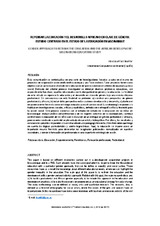Repensar la educación y el desarrollo africano en clave de género: estudio centrado en el estado de la educación en Mozambique
Gender approach to rethink the education and the african development: Mozambican education study
Autor
Martínez Martín, Irene
Editor
Universidad de Córdoba, UCOPressFecha
2015Materia
EducaciónEmpoderamiento
Feminismos
Formación profesorado
Postcolonial
Education
Empowerment
Feminisms
Teacher training
Post-colonialism
METS:
Mostrar el registro METSPREMIS:
Mostrar el registro PREMISMetadatos
Mostrar el registro completo del ítemResumen
Esta comunicación se contextualiza en una serie de investigaciones llevadas a cabo en el marco de
proyectos de cooperación al desarrollo en Mozambique y una Tesis doctoral. Tales proyectos tienen como
objetivo común aproximarse al estado de la educación del país basándose en criterios de equidad y justicia
social. Derivado del anterior proceso investigador se detectan diversos problemas educativos, son
especialmente llamativos aquellos relacionados con la desigualdad de género y la educación. La finalidad
de este artículo es repensar la educación y el desarrollo en clave de género bajo una mirada africanapostcolonial.
En consonancia con esta finalidad se pretende: a) construir una perspectiva de género
postcolonial y africana; b) incluir dicha perspectiva en las acciones de educación y desarrollo; c) plantear el
empoderamiento feminista como estrategia educativa para el cambio social. La metodología responde a la
habitual en investigaciones sociales, críticas y cualitativas, definida como etnografía crítica y feminista para
la acción social. Este proceso comienza con el estudio del estado de la educación de las niñas en
Mozambique –incluye análisis del profesorado y de las mujeres activistas de la sociedad civil-; continúa
contrastando la educación de las niñas con la inclusión de un enfoque de género postcolonial y africano,
previamente construido a partir del amplio estudio documental y bibliográfico. Por último, los resultados y
conclusiones previstos responden a la construcción de una pedagogía feminista y transformadora que tenga
en cuenta las lógicas postcoloniales y contra-hegemónicas. Aquí, la educación se impone como un
importante recurso feminista para desmontar los imaginarios patriarcales normalizados en nuestras
sociedades, y donde la formación del profesorado es una importante estrategia de acción. This paper is based on different researches carried out in a development cooperation projects in
Mozambique and in a PhD. Such projects have the same goal which is: to get to know the Mozambican
education with a particular gender approach, that can be define as equality and social justice. These
researches have as a result the knowledge about different educational needs, where we can highlight the
gender inequality in the education. The main goal of this paper is to re-think the education and the
development with a gender and postcolonial approach. Related with this goal, the main research ideas are:
a) to build a postcolonial and African gender approach; b) to include this approach in the education and
development practices; c) to make the women's empowerment as an educational strategy for social change.
The study methodology can be defined as social, critic and qualitative research. This research, also, is
defined as a feminist ethnography for social action, where the voices of the girls and women have an
important role. In this research we have done some interviews with teachers and women activists of the civil society. At the end we have interrelated this process with the gender approach. To make this approach is
so important the documentary and bibliography study. Finally, the research results can make a feminist and
transformative pedagogy that would include the postcolonial knowledge. Here, education is thinking as an
important feminist resource to fight against the patriarchal standards, where the teacher training is revealed
as an important strategy for the equality.

